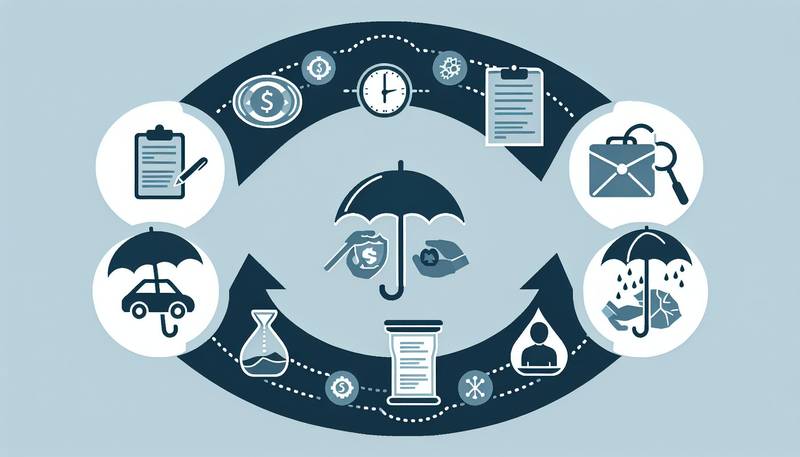Insurance for Nonprofits: Special Considerations and Needs
Nonprofit organizations play a crucial role in our society, providing much-needed services and support to vulnerable populations, championing important causes, and filling gaps where government and private sector initiatives fall short. Like any other organization, nonprofits face risks and challenges, and having the right insurance coverage in place is essential to protect their mission, assets, and people.
- 1/24/2024
- 3 min read
 Click
to read the article
Click
to read the article
However, nonprofit organizations have unique considerations and needs when it comes to insurance, and it is important for them to understand these factors in order to make informed decisions about their coverage.
Understanding Nonprofit Insurance
Nonprofit insurance is a specialized type of coverage designed to meet the unique needs of organizations that operate for charitable, educational, religious, scientific, or other nonprofit purposes. While many of the insurance products available to nonprofits are similar to those offered to for-profit businesses, there are some key differences in terms of coverage, pricing, and risk management.
Nonprofit organizations typically require a combination of insurance policies to adequately protect themselves from various risks. Common types of insurance coverage for nonprofits include general liability insurance, property insurance, directors and officers (D&O) insurance, volunteer insurance, cyber liability insurance, and professional liability insurance. Each of these policies serves a specific purpose and provides protection against different types of risks that nonprofits may face.
Special Considerations for Nonprofits
When it comes to insurance, nonprofits must consider their unique organizational structure, activities, and stakeholders. Unlike for-profit businesses, nonprofits often rely on volunteers, have a board of directors, and serve a distinct mission that may involve working with vulnerable populations or engaging in advocacy and activism. These factors can have a significant impact on the types of insurance coverage that a nonprofit needs.
For example, many nonprofits rely heavily on volunteers to carry out their work, and it is important for organizations to have volunteer insurance in place to protect these individuals in case of accidents or injuries. Similarly, nonprofits must carefully consider their D&O insurance coverage to protect their board members and key decision-makers from personal liability for the organization's actions.
Risk Management for Nonprofits
Effective risk management is crucial for nonprofits to protect their assets, reputation, and mission. In addition to having the right insurance coverage in place, nonprofits must also implement sound risk management practices to identify, assess, and mitigate potential risks. This may involve conducting regular risk assessments, developing appropriate policies and procedures, providing training to staff and volunteers, and implementing safeguards to protect against cyber threats and other emerging risks.
By proactively managing risks, nonprofits can reduce the likelihood of costly insurance claims, lawsuits, and other disruptions that could jeopardize their ability to fulfill their mission. Insurance companies may also view organizations that have strong risk management practices more favorably, leading to lower premiums and better coverage options.
Finding the Right Insurance Coverage
Finding the right insurance coverage for a nonprofit organization can be a complex process, requiring careful consideration of the organization's unique needs and circumstances. Nonprofits may benefit from working with an insurance broker or agent who specializes in nonprofit insurance and can help them navigate the complexities of the insurance market.
When selecting insurance coverage, nonprofits should consider factors such as the organization's activities, size, budget, and risk tolerance. It is important to review insurance policies carefully, understand the terms and conditions, and work with a reputable insurer that has experience working with nonprofits.
In conclusion, insurance is an essential tool for nonprofits to protect their mission, assets, and people from a variety of risks. By understanding their unique considerations and needs, implementing sound risk management practices, and finding the right insurance coverage, nonprofits can safeguard their organization and continue making a positive impact in their communities.
Recent posts
Random news

The Evolution of the Insurance Industry: A Historical Perspective
- 2024-03-01T00:00:00Z

Understanding Premiums, Deductibles, and Coverage Limits
- 2024-01-15T00:00:00Z

The Role of Underwriting in Insurance
- 2023-12-27T00:00:00Z

Exploring the Different Types of Liability Insurance
- 2023-12-11T00:00:00Z

The Benefits and Limitations of Whole Life Insurance
- 2024-03-06T00:00:00Z

An Introduction to Commercial Insurance for Business Owners
- 2024-02-02T00:00:00Z

Travel Insurance: Why It's Essential for Your Next Trip
- 2024-01-18T00:00:00Z

Renters Insurance: An Often Overlooked Necessity
- 2023-12-11T00:00:00Z

Pet Insurance: Is It Worth the Cost?
- 2023-12-30T00:00:00Z

Auto Insurance Essentials: What Every Driver Needs to Know
- 2023-12-14T00:00:00Z

Tips for Lowering Your Insurance Premiums
- 2023-12-30T00:00:00Z

Cyber Insurance: Protecting Businesses in the Digital Age
- 2024-02-04T00:00:00Z

The Importance of Disability Insurance in a Financial Plan
- 2024-01-27T00:00:00Z

Insurance and Natural Disasters: How to Protect Your Home
- 2023-12-19T00:00:00Z

The Impact of Technology on the Insurance Sector
- 2024-01-15T00:00:00Z

Critical Illness Insurance: What It Covers and Why It's Important
- 2023-12-29T00:00:00Z

Insurance Fraud: Detection, Prevention, and Consequences
- 2024-02-24T00:00:00Z

The Psychology Behind Insurance: Trust, Risk, and Decision Making
- 2023-12-30T00:00:00Z

The Global Insurance Market: Trends and Growth Opportunities
- 2023-12-14T00:00:00Z

The Intersection of Artificial Intelligence and the Insurance Industry
- 2024-02-12T00:00:00Z

Life Insurance: Securing Your Family's Future
- 2024-02-20T00:00:00Z

How Climate Change is Shaping the Insurance Industry
- 2024-03-08T00:00:00Z

Group Insurance Plans: Benefits for Employers and Employees
- 2024-02-09T00:00:00Z

Reinsurance Explained: How It Works in the Insurance Industry
- 2024-02-03T00:00:00Z

Environmental Liability Insurance: What Businesses Need to Know
- 2024-02-17T00:00:00Z

The Future of Insurance: Predictions and Innovations
- 2024-01-04T00:00:00Z

Insurance for Freelancers: Protecting Your Independent Career
- 2024-03-03T00:00:00Z

Annuities: Combining Insurance and Investment for Retirement
- 2024-03-17T00:00:00Z

Marine Insurance: Covering the Risks of Sea Transport
- 2024-01-28T00:00:00Z

Flood Insurance: Understanding Your Coverage Options
- 2024-02-03T00:00:00Z

The Role of Agents and Brokers in the Insurance Industry
- 2023-12-11T00:00:00Z

How Insurance Supports Economic Growth and Stability
- 2023-12-25T00:00:00Z

Vision Insurance: Seeing the Benefits Clearly
- 2024-02-22T00:00:00Z

Insurance Against Identity Theft: What You Need to Know
- 2024-02-07T00:00:00Z

The Rise of Telemedicine and Its Impact on Health Insurance
- 2024-03-17T00:00:00Z

Insurance in the Sharing Economy: Challenges and Solutions
- 2024-01-15T00:00:00Z

Digital Platforms Transforming the Insurance Buying Experience
- 2024-03-10T00:00:00Z

The Intersection of Blockchain Technology and the Insurance Industry
- 2024-03-07T00:00:00Z

Understanding the Insurance Policy Lifecycle
- 2023-12-14T00:00:00Z

Understanding the Fine Print: Insurance Policy Exclusions
- 2024-02-11T00:00:00Z

Making Sense of Health Savings Accounts (HSAs) and Insurance
- 2024-03-12T00:00:00Z

Insurance and Public Health: A Complex Relationship
- 2023-12-27T00:00:00Z

Long-Term Care Insurance: Planning for the Future
- 2024-02-23T00:00:00Z

Insurance Literacy: Understanding Your Rights and Responsibilities
- 2024-02-10T00:00:00Z

Insurance for Young Adults: What You Need to Know
- 2024-01-04T00:00:00Z

The Changing Landscape of Life Insurance: Trends to Watch
- 2024-03-02T00:00:00Z

Insurance Claims: A Step-by-Step Guide to Filing and Settlement
- 2024-02-21T00:00:00Z

The Economics of Insurance: How Markets Operate
- 2024-02-21T00:00:00Z

Bridging the Gap: Insurance and Social Justice
- 2024-03-08T00:00:00Z

The Ins and Outs of Motorcycle Insurance
- 2023-12-17T00:00:00Z

The Legal Landscape of Insurance: Key Regulations and Challenges
- 2024-01-28T00:00:00Z

Directors and Officers Insurance: Safeguarding Corporate Leaders
- 2023-12-25T00:00:00Z

A Guide to Managing Insurance Costs in Small Businesses
- 2024-02-27T00:00:00Z

Insurance and Retirement Planning: A Comprehensive Approach
- 2023-12-20T00:00:00Z

Mobile Home Insurance: Coverage and Considerations
- 2023-12-27T00:00:00Z

Disaster Preparedness: The Role of Insurance in Recovery
- 2024-02-25T00:00:00Z

Navigating the Complex World of Health Insurance
- 2024-01-17T00:00:00Z

The Significance of Actuarial Reports in the Insurance Industry
- 2024-02-21T00:00:00Z

How Insurance Policies Are Priced: The Basics of Actuarial Science
- 2024-03-14T00:00:00Z

The Psychology of Insurance: How Coverage Affects Behavior
- 2024-01-01T00:00:00Z

Dental Insurance: Navigating Coverage and Care
- 2024-01-22T00:00:00Z

Umbrella Insurance: Extra Protection Beyond Standard Policies
- 2023-12-31T00:00:00Z

Specialty Insurance: Coverage for Unique Needs and Risks
- 2024-02-09T00:00:00Z

The Challenges and Benefits of High-Deductible Health Plans
- 2024-01-27T00:00:00Z

Understanding Coinsurance: What It Means for Your Wallet
- 2024-03-16T00:00:00Z

Crop Insurance: Supporting Farmers Through Uncertainty
- 2024-01-19T00:00:00Z

Navigating Insurance for Mental Health Services
- 2024-02-09T00:00:00Z

The Role of Insurance in Estate Planning
- 2024-01-23T00:00:00Z

How to Handle Insurance Claims Disputes
- 2024-01-21T00:00:00Z

Condominium Insurance: Understanding Policies and Protection
- 2024-03-09T00:00:00Z

Short-Term Health Insurance: Pros and Cons
- 2024-02-10T00:00:00Z

Understanding the Role of Insurance Adjusters
- 2023-12-25T00:00:00Z

Workers' Compensation: Ensuring Protection for Employees and Employers
- 2024-02-12T00:00:00Z

Healthcare Sharing Ministries vs. Traditional Health Insurance
- 2024-03-19T00:00:00Z

The Future of Autonomous Vehicles and Insurance Implications
- 2024-01-17T00:00:00Z

Gap Insurance: Closing the Coverage Gap in Auto Loans
- 2023-12-16T00:00:00Z

Antique and Collector Car Insurance: A Unique Protection
- 2024-01-13T00:00:00Z

The Impact of Regulatory Compliance on the Insurance Industry
- 2024-02-11T00:00:00Z

Disaster Insurance: Preparing for the Unexpected and Recovering Afterward
- 2024-01-01T00:00:00Z

Navigating the Insurance Marketplace: Strategies for Consumers
- 2024-03-14T00:00:00Z

The Role of Insurance in Disaster Response and Recovery
- 2023-12-12T00:00:00Z

Insurance and Ethics: Navigating Moral Dilemmas in the Industry
- 2023-12-31T00:00:00Z

Maximizing Benefits: Strategies for Effective Insurance Utilization
- 2024-02-05T00:00:00Z


Insurance for Nonprofits: Special Considerations and Needs
- 2024-01-24T00:00:00Z

The Future of Insurance: How Technology is Shaping Coverage and Customer Service
- 2024-02-19T00:00:00Z

Understanding the Fine Print: Key Terms and Conditions in Insurance Policies
- 2024-02-06T00:00:00Z

Life Insurance: Securing Your Family's Future in Uncertain Times
- 2024-02-04T00:00:00Z

Peer-to-Peer Insurance: A New Model for Sharing Risk
- 2024-01-03T00:00:00Z

Navigating the Maze: Choosing the Right Insurance Policy for Your Needs
- 2024-02-26T00:00:00Z

Commercial Insurance: Protecting Your Business from Unseen Risks
- 2024-01-10T00:00:00Z

Insurance and Customer Experience: The Journey to Satisfaction
- 2024-01-24T00:00:00Z

The Evolution of Insurance: From Ancient Times to the Digital Age
- 2024-02-16T00:00:00Z

Insurance Fraud: The Impact on Policyholders and How to Protect Yourself
- 2024-02-13T00:00:00Z

Health Insurance Explained: What You Need to Know to Protect You and Your Family
- 2024-03-06T00:00:00Z

Auto Insurance: Tips for Choosing the Right Coverage and Saving Money
- 2024-01-30T00:00:00Z

Supplemental Insurance: Filling the Gaps in Coverage
- 2024-01-26T00:00:00Z

How to Choose the Right Insurance Policy for Your Needs
- 2024-01-30T00:00:00Z

The Role of Insurance in Mitigating Financial Risk
- 2023-12-06T00:00:00Z

Understanding the Basics of Insurance: A Beginner's Guide
- 2024-03-04T00:00:00Z
 InsurePath: Navigating Your Way to Peace of Mind
InsurePath: Navigating Your Way to Peace of Mind